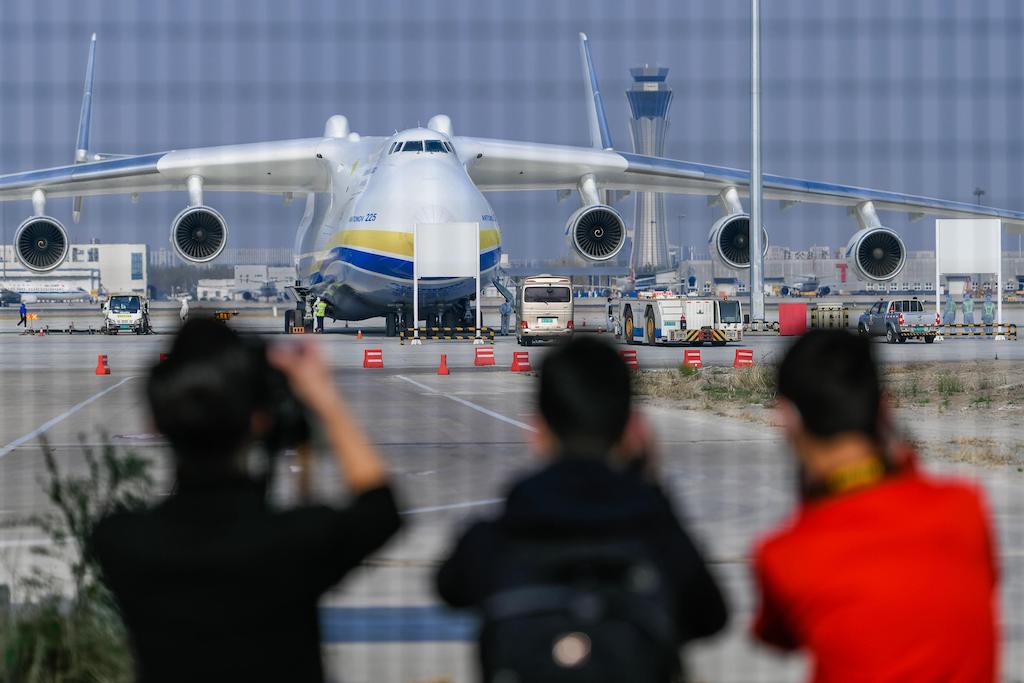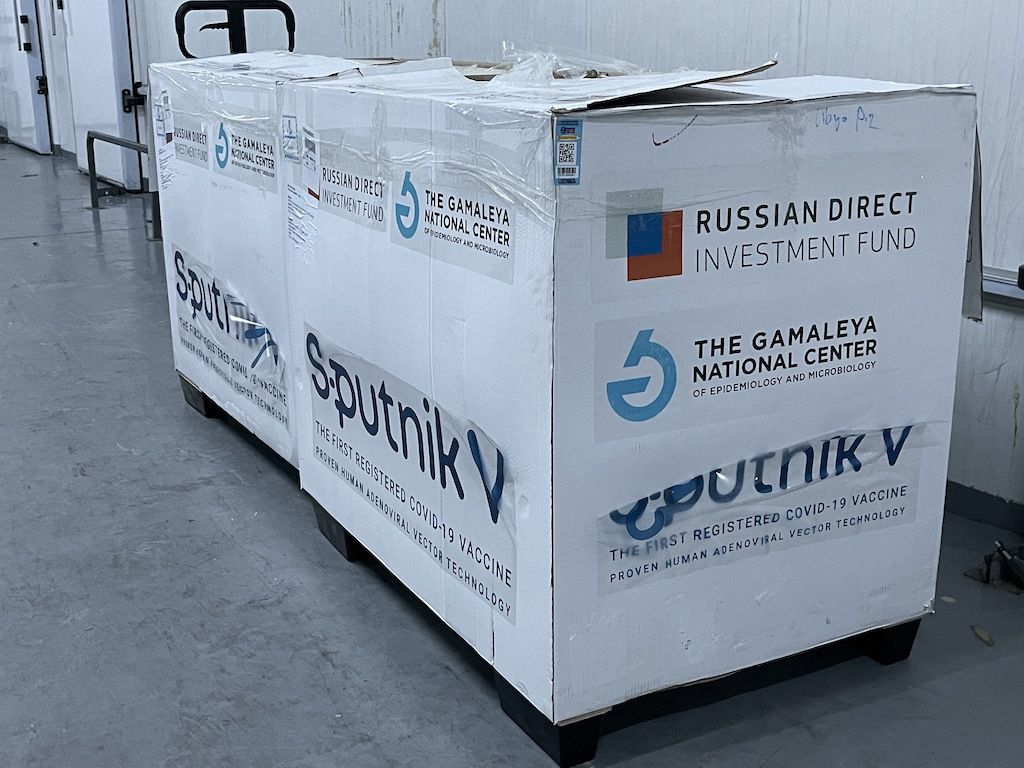Soft power lessons from China and Russia
Russia’s and China’s vaccine deliveries come with soft power messages. The EU extends significant pandemic-related aid to its neighbors and the international community, but its “political signaling” has been weak – and its vaccination rollout too slow.

In a nutshell
- China’s and Russia’s vaccines come with political messages
- The European Union defends its response to Covid-19
- EU vaccinations fumbles will recede in public perception
As Covid-19 continues to rage throughout Europe, China and Russia seem to be giving the European Union lessons in soft power on its home ground. EU members and countries nearby are turning to Beijing and Moscow for additional supplies of Covid-19 vaccines, faced with rising discontent at the slow rollout of the EU’s own vaccination strategy, supply shortages, delivery bottlenecks, poor communication and concerns about vaccine safety.
China’s vaccine deliveries come with soft power messages. Beijing is making its vaccine available free to Chinese citizens and to 53 countries. A senior Chinese government spokesman recently presented his country as a good global citizen and denied using vaccines to expand its geopolitical influence. Still, as part of its efforts to project Chinese scientific achievements, culture and language, Beijing is now completing Europe’s largest Confucius Institute in Serbia, an early recipient of Chinese vaccines. The institution is located on the site in Belgrade where the Chinese embassy once stood before being bombed by NATO in 1999.
Heavy symbolism
Russia’s Sputnik V vaccine is gaining increasing acceptance in Europe, ahead of approval by the European Medicines Agency (EMA), winning plaudits from the head of Germany’s standing commission on vaccination. The German health minister has discussed overcoming supply shortages in the EU with Chinese and Russian vaccines once they have been approved. The Bavarian prime minister and possible contender to replace Chancellor Angela Merkel has announced a preliminary purchase order for 2.5 million doses of Sputnik V, to be produced in Bavaria. Ms. Merkel said in March that there was “good data” on Sputnik V and that all vaccines were welcome once they had received the green light.
Russia does not miss a chance to accompany vaccine deliveries in Eastern Europe and the Balkans with soft power discourse.
She and French President Emmanuel Macron have discussed joint production of Sputnik V with Russian President Vladimir Putin. But tensions with Moscow are running high following the imprisonment and illness of opposition leader Alexey Navalny and Russia’s troop buildup near Ukraine. Rather than turn to Moscow, Ukraine has begun deploying AstraZeneca vaccines made in India and is considering purchasing vaccines from China. Moldova has started to receive the AstraZeneca vaccine from Romania as part of its EU allocation.
Russia does not miss a chance to accompany vaccine deliveries in Eastern Europe and the Balkans with soft power discourse, dwelling on European failures and vaunting Russian support for countries covered by the EU’s enlargement and neighborhood policies.
China’s President Xi Jinping has declared Chinese vaccines “a global public good” and Beijing is targeting low- and medium-income countries for early vaccine deliveries. It has supplied vaccines to Hungary, an EU member, and EU candidate countries Serbia and Turkey. Hungarian Prime Minister Viktor Orban posted a photo of himself being inoculated with a vaccine from Chinese manufacturer Sinopharm. Russia has made a show of vaccine deliveries to Serbia and Montenegro, while Croatia has begun talks with Russia about acquiring the Sputnik V vaccine. Croatia’s health minister is reported to have asked its regulator to authorize the vaccine without waiting for the EMA’s approval.
The Czech Republic and Slovakia have also turned to Russia for supplies of the Sputnik V vaccine, ahead of an EMA green light. But Slovak Prime Minister Igor Matovic resigned in March after failing to obtain the governing coalition’s agreement for his personal decision to purchase 2 million doses of the Russian vaccine. Hungary became the first European country to administer Sputnik V in February 2021, after giving it an emergency authorization, and plans are afoot to produce the vaccine in Italy.
Diverging approaches
Austria has held talks with Moscow about acquiring the Russian vaccine once it has been authorized by the EMA (the agency has started a “rolling review” of the product). Austria’s Chancellor Sebastian Kurz accused the EMA of being too slow to approve the vaccine; he said that his country could not rely on the EU to develop vaccines against the virus’s future strains. Austria, together with Denmark, announced a joint vaccine development venture with Israel. France rebuked the two countries, insisting on the primacy of EU initiatives to fight Covid-19.
EU countries are entitled to acquire vaccines approved by their regulatory authorities from suppliers not involved in the EU’s centralized scheme. But a senior EMA official condemned this as “somewhat comparable to Russian roulette,” a remark which prompted calls for an apology from the Sputnik V manufacturer and criticism from the Kremlin.
Russia rushed to become the first country whose Covid-19 vaccine was approved by national authorities.
Alarmed at member countries breaking ranks, European Council President Charles Michel launched a fierce defense of the EU’s response to Covid-19. He wrote in his newsletter: “We should not let ourselves be misled by China and Russia, both regimes with less desirable values than ours, as they organize highly limited but widely publicized operations to supply vaccines to others.”
A geopolitical open door
Nonetheless, the late rollout of the EU’s scheme to purchase vaccines on behalf of member countries, delivery setbacks, poor communication and the virus’s ravages across Europe handed Beijing and Moscow a commercial and diplomatic opportunity that fitted their strategic narratives. For China, supplying vaccines to Europe forms part of its “Health Silk Road,” a rhetorical extension of its Belt and Road Initiative (BRI) intended to showcase the prowess of China’s medical sciences and its devotion to global public goods. China promotes the BRI in Central and Eastern Europe through 17+1, a loose network launched in Warsaw in 2012. At the start of the epidemic, China and Russia stepped in to provide masks and personal protective equipment to European countries amid severe supply shortages.

Moscow, too, seeks to convey the impression that its medical science is prevailing over the West’s, despite low vaccination rates in Russia itself. The name Sputnik V mirrors that of the world’s first artificial satellite, launched by the Soviet Union in 1957. Russia rushed to become, on August 11, 2020, the first country whose Covid-19 vaccine was approved by national authorities.
China and Russia are pushing at an open door in Eastern Europe because of the EU’s faltering strategies in the Balkans and Eastern Partnership countries. The EU promised membership to Balkan countries almost two decades ago at the Thessaloniki summit. Since then, only Croatia has joined the EU, and there are scant prospects for others doing so in the foreseeable future. Persistent governance problems in the Balkans and enlargement fatigue in the EU are responsible for the stalemate.
Despite repeated assertions that the region is destined for EU membership, the block lacks a credible geopolitical strategy for the Balkans, an area surrounded by members that are its major donors and investors. The EU has provided 70 million euros from existing funds to Balkan countries to acquire vaccines as well as a 3.3 billion-euro package to tackle the health crisis, support investment and stimulate recovery. Balkan and Eastern Partnership countries are eligible for vaccines under the World Health Organization’s global Covax scheme for low- and medium-income countries. The EU recently doubled its contribution to the scheme to 1 billion euros. But these efforts fall far short of neighboring countries’ needs and of the Covid-fighting programs deployed within the EU itself.
In March, the European Commission ended Balkan countries’ exemption from EU vaccine export controls, further diminishing the credibility of its soft power outreach to the region.
Foreign ministers from nine EU countries on March 11, 2021, called on the Union “to take a strategic look at the Western Balkans.” They asserted that the pandemic had exacerbated existing trends, with their geopolitical implications, and that “other actors are ready to step into regional affairs, often at our expense.” They concluded that “while the EU has mobilized massive amounts of support to the region, other actors were more effective in presenting their support and thus undermining our reliability, credibility and perception of our solidarity.”
Few in Europe and its eastern periphery seek to emulate the Chinese model of governance and society.
Earlier, in January 2021, a large group of foreign ministers, mainly from the EU’s new member states, made a similar plea on behalf of Ukraine, Moldova, Georgia, Armenia and Azerbaijan, which participate in the EU’s Eastern Partnership. The initiative was intended to create a ring of well-governed states around the EU, an aspiration that remains largely unfulfilled. The EU provides support for the health sector, business and vulnerable parts of society in these countries. But, here, too, the EU’s involvement lacks clear geopolitical thrust. Georgia’s ambassador to the EU has observed that the EU is “very clearly weak” on “political signaling” to the region.
Vaccine diplomacy and soft power
Yet it would be premature to endorse the view of a senior French commentator that “in a world where the vaccines have become a new measure of geopolitical power, no doubt President Vladimir Putin of Russia and President Xi Jinping of China will smile at the sight of Europe’s difficulties.” Despite the diplomatic and commercial agility with which China and Russia have moved to fill the vaccine and geopolitical gaps to the EU’s east and southeast, their soft power appeal to the countries concerned is limited.
Soft power derives from the attractiveness of an international actor’s political, economic and social model and others’ aspiration to emulate it. China’s success in containing the pandemic domestically and the early availability of its vaccines notwithstanding, few in Europe and its eastern periphery seek to emulate the Chinese model of society. Russia, too, holds little appeal to populations in Europe’s east whose main preoccupations are unemployment, living and governance standards and, in some cases, corruption. Disinformation, domestic repression and cyberattacks do little to endear the Chinese and Russian regimes to public opinion in Europe.
Some 59 percent of respondents across the Balkans in the latest Balkan Barometer survey consider that EU membership would be a good thing, up from 42 percent in 2014, the baseline year. The benefits of EU membership cited most often are greater prosperity and freedom to travel for work and study. Serbia, where state television regularly presents the EU in a negative light while depicting China and Russia positively, is an outlier, with less than a third favoring EU membership. However, there is growing pessimism in the region about the prospects for joining the EU.
In Eastern Partnership countries, where the most recent regional survey was conducted in 2019 before the pandemic, just over half the respondents have a favorable view of the EU; 80 percent associate it with economic prosperity and human rights. The EU’s response to Covid-19 may have dented its image, but the Union’s overall appeal is still growing in the Balkans and beyond.
Scenarios
At the same time, Chinese and Russian narratives have failed to gain traction. Chinese companies are engaged in public works, especially in Serbia. But infrastructure projects promoted by China’s BRI have provoked environmental protests, created few jobs for local workers and raised debt levels to unsustainable levels, particularly in Montenegro. Some major projects have been canceled or remain incomplete. Six EU member states forming part of the 17+1 initiative were represented only by lower-rank officials at a virtual summit hosted by President Xi in February, a setback that may herald the demise of this grouping.
Some governments in the Balkans and Eastern Europe appear to be prioritizing vaccines from China and Russia. That is less on geopolitical grounds than as a response to delays in delivery by Western suppliers. President Aleksandar Vucic of Serbia and Prime Minister Viktor Orban of Hungaryexemplify this opportunistic, tactical approach. Mr. Vucic takes pride in offering citizens a choice of European, Chinese and Russian vaccines, claiming that he remains equidistant from all three. But recently, concerns have grown about the immunity given by Chinese vaccines and about its availability. Trust in the reliability of Russian data and the comparability of its tests is still wavering.
By contrast, people in neighboring countries still see the EU, for all its setbacks and mixed messaging, as providing their only exit strategy from corruption, dysfunctional rule and state capture. The EU’s task is to meet its regional partners’ expectations. It can achieve that only by speeding up vaccine delivery, ensuring that recovery funds are well spent, eschewing internal bickering and conveying a greater sense of inclusiveness to governments and peoples nearby.
The EU’s move into the field of public health, hitherto reserved mainly to national governments, is unlikely to be a “Monnet moment” in which European integration leaps forward. But neither will it prove to be a tipping point, leading to disintegration. The EU’s fumbles in responding to the pandemic, as much the fault of national governments as of Brussels, will recede in public perception provided a high degree of immunity is reached this summer, with commensurate progress in neighboring countries, and provided the economy begins to revive.
Chinese and Russian vaccine diplomacy offers a partial workaround for EU delays but not a strategic choice. The aspiration to strengthening democracy and to closer EU links remains strong both in the Balkans and in Georgia, Moldova and Ukraine. Saber-rattling by Moscow over Ukraine will reinforce these countries’ tilt to the west. Setbacks in fighting the pandemic have dented but not destroyed the EU’s soft power in the Balkans and Eastern Europe.








